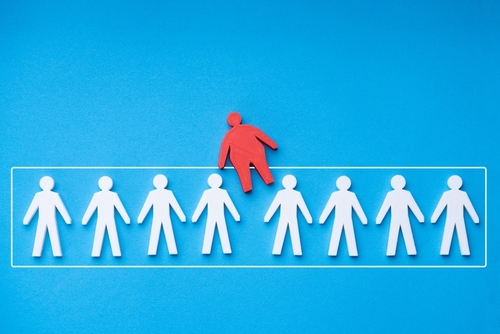When we hear the words diversity, equity, and inclusion (DEI), many people automatically think of race and ethnicity as a focal point. However, DEI extends far beyond just race alone. Diversity is the variety of backgrounds, lived experiences, identities, and even perspectives of an individual. In the case of weight, many people don’t often consider how their weight or size is an association of their identity. However, weight and body size are indeed aspects of who we are, just like gender, race, geographic origin, and more. Weight discrimination, therefore, is any type of harm, injustice, or oppression that’s caused because of an individual’s weight or body size. While some may believe only those who are considered overweight or obese experience this type of discrimination, those who have small frames and body sizes experience it, as well. Exclusion and harm can happen in either direction.
Within the workplace, weight discrimination can manifest in HR practices like decision-making for promotions and avenues leveraged for staff culture-building and many more aspects of day-to-day operations. Staff outings and appreciation activities that require strenuous lifting, climbing, and movement that’s incredibly challenging for a team member or team member who may not be able to do them, may exercise pain while doing them, or may experience discomfort or shame while doing them is an example of not being mindful when selecting or choosing activities that accommodate the physical and health needs of all employees.
This doesn’t mean a company shouldn’t schedule a rock-climbing exercise, but if it does, it should also offer a second or third alternative so all employees can participate and feel good and comfortable during the experience. Another example would be denying someone a promotion to a new leadership position or not providing career networking and advancement opportunities to an employee based on their physical appearance.
How to Address Weight Discrimination in the Workplace
Organizations can do a great deal to combat weight discrimination in the workplace through ongoing education and training to equip all team members with the knowledge and skills to proactively create an inclusive environment for all employees and to learn how to combat such harmful practices and policies in real time. Moreover, developing a plan of action as to how the organization will intentionally measure and monitor its work to ensure psychological and emotional safety for all staff regardless of their weight or body size is key, as well. This helps organizations move from theory to action and accountability in following up after any training opportunities.
When employees report concerns with matters involving their identity, one of the first things an employer can do is make a choice to believe them, to investigate and take it seriously, and to take action to make a change. This likely demonstrates an area that needs to be improved or a blind spot in overall team dynamics, as well as staff culture and company climate, that needs to be addressed.
Krystal Allen is the Founder and CEO of K. Allen Consulting, an education advocate, and a philanthropist. A native of Selma, Alabama, she’s a well-respected former school principal and teacher. She began her career teaching elementary school, serving as an instructional coach, then an assistant principal, and finally leading as a school principal. Most recently featured in TIME magazine, she’s a 2019 Gambit 40 Under 40 recipient, a 2019 Aspen Institute Ideas Festival Scholar, and the 2016 Urban League of Louisiana Activist Award recipient and serves as a member of the Board of Directors of Kid Smart, Success at Thurgood Marshall, and the Selma Center for Nonviolence.
A first-generation college graduate, Allen earned her BA from the University of Notre Dame and MEd from NLU-Chicago and is currently completing her EdD in K–12 Urban Educational Leadership at Teachers College, Columbia University. Her work and passion for DEI, social justice, adult learning, and organizational development are the driving forces of her work and commitment to equity.

